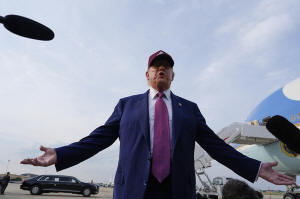Trump says US gets rare earth minerals from China and tariffs on Chinese
goods will total 55%
[June 12, 2025] By
DARLENE SUPERVILLE, JOSH BOAK, PAUL WISEMAN and DIDI TANG
WASHINGTON (AP) — President Donald Trump announced Wednesday that China
will make it easier for American industry to obtain much-needed needed
magnets and rare earth minerals, clearing the way for talks to continue
between the world's two biggest economies. In return, Trump said, the
U.S. will stop efforts to revoke the visas of Chinese nationals on U.S.
college campuses.
Trump’s comment on social media came after two days of high-level
U.S.-China trade talks in London.
Details remain scarce. Trump didn't fully spell out what concessions the
U.S. made. Beijing has not confirmed what the negotiators agreed to, and
Chinese President Xi Jinping and Trump himself have yet to sign off on
it.
What Trump described as a “deal’’ is actually less than that: It’s a
“framework’’ meant to set the stage for more substantive talks.
And Trump's own comments created confusion about what was happening to
his taxes - tariffs — on Chinese imports, generating uncertainty about
more than $660 billion in annual trade between the two countries.
On social media, Trump declared: “WE ARE GETTING A TOTAL OF 55% TARIFFS,
CHINA IS GETTING 10%. RELATIONSHIP IS EXCELLENT!” But a White House
official, who was not authorized to discuss the terms publicly and
insisted on anonymity to describe them, said the 55% was not an increase
on the previous 30% tariff on China because Trump was including
pre-existing tariffs, including some left over from his first term.

“We have no idea what the rules are,″ said Rick Woldenberg, CEO of the
educational toy company Learning Resources, who is part of a lawsuit
challenging Trump’s authority to impose the tariffs.
In a follow-up social media post, Trump said he and Xi "are going to
work closely together to open up China to American Trade. This would be
a great WIN for both countries!!!”
The framework emerged late Tuesday in London after intense talks
involving U.S. Treasury Secretary Scott Bessent, Commerce Secretary
Howard Lutnick and U.S. Trade Rep. Jamieson Greer. Leading the Chinese
delegation was Vice Premier He Lifeng.
Since returning to the White House in January, Trump has deployed
tariffs aggressively, seeing them as a way to raise money for the
federal government, protect American industries, lure factories back to
the United States and pressure other countries into bending to his will.
He has imposed baseline 10% tariffs on imports from almost every country
on earth after having introduced and then suspended for 90 days bigger
tariffs on countries based on the size of U.S. trade deficits last year.
To American trading partners and to businesses calculating their import
tax bills, the president's mercurial approach to trade policy can be
baffling. For example, he recently doubled his steel and aluminum
tariffs to 50%, likely increasing costs for U.S. manufacturers and
construction companies that rely on the metals as raw materials.
Likewise, he threatened a 50% tariff on the European Union under the
belief that it would jumpstart talks with the bloc, only to back down as
his self-imposed 90-day negotiating period is set to expire around July
9.
But his approach to China has been especially bewildering. After
imposing a 20% tariff on Chinese imports, the American president quickly
upped the ante, raising the levy to 54% to offset what he said were
China’s unfair trade practices. Then, enraged when China retaliated with
tariffs of its own, he increased those levies to a staggering 145%.
Beijing counterpunched with 125% tariffs on U.S. imports.
[to top of second column] |

President Donald Trump speaks to reporters after arriving on Air
Force One, Tuesday, June 10, 2025, at Joint Base Andrews, Md. (AP
Photo/Alex Brandon)
 Those triple-digit tariffs
threatened to effectively end trade between the United States and
China, causing a hair-raising selloff in financial markets. At a
meeting in Geneva last month, the two countries agreed to back off:
America's tariffs went back down to a still-high 30% and China's to
10%.
In April, the Chinese announced licensing requirements that slowed
the supply of desperately needed rare earth minerals to the United
States. Furious about the move, Trump threatened to call off the
Geneva arrangement, setting the stage for talks Monday and Tuesday
in London. And there the Chinese agreed to speed up the rare earths
shipments.
The agreement came as an international rights group said that
several global brands are among dozens of companies at risk of using
forced labor through their Chinese supply chains because they use
critical minerals or buy minerals-based products sourced from the
far-western Xinjiang region of China.
The report by the Netherlands-based Global Rights Compliance says
companies including Avon, Walmart, Nescafe, Coca-Cola and
Sherwin-Williams may be linked to titanium sourced from Xinjiang,
where rights groups allege the Chinese government runs coercive
labor practices targeting predominantly Muslim Uyghurs and other
Turkic minorities.
Many analysts complained that all the drama hadn't accomplished
much.
Dan Kritenbrink, who was assistant secretary of state for East Asian
and Pacific Affairs in the Biden administration, said the London
meeting produced “a fragile truce.”
“Both sides have now demonstrated that they know where the other’s
weak points are,” said Kritenbrink, now a partner at the Asia Group.
"They demonstrated that they both have leverage and tools they can
use to inflict damage on the other.''
The Chinese know that when it comes to rare earths they “can turn
that spigot on and off at will... They really have incredible
leverage over the United States in the global economy with rare
earths, and they’re not afraid to use it.''
Still, he welcomed the London ceasefire because "the alternative is
no truce at all, and a supply chain war that threatens not just U.S.
and Chinese economies but the global economy as well.”
Danny Russel, vice president for international security and
diplomacy at the Asia Society Policy Institute, said Trump’s latest
pressure campaign on China appeared to “be ending with a whimper,
not a bang.”

“The U.S. found it needed to back off the restrictions it had
thought would generate leverage,'' he said, "and in exchange, they
get merely a promise by the Chinese to dole out critical minerals a
bit more quickly.”
Veronique de Rugy, senior research fellow at George Mason
University's Mercatus Center, dismissed the London truce as "a
handshake deal ... It can change at any time.''
All contents © copyright 2025 Associated Press. All rights reserved |